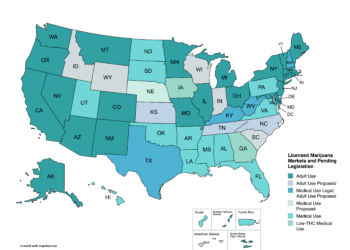Ohio’s Division of Cannabis Control is currently churning through its first round of applicants for the Buckeye State’s upcoming adult-use cannabis market. Although regulators have yet to issue a single certificate of operation to a dispensary, almost all of the state’s medical dispensaries have at least been awarded a provisional license to also sell non-medical cannabis.
Well over 100 operators have received provisional licenses, and 34 certificates of operation have been issued, said James Crawford, public information officer for the Department of Commerce, which oversees the cannabis control division.
Licensing is moving at a good pace, according to Tom Haren, spokesperson for the Ohio Cannabis Coalition.
“I said to folks at this time last year that we would see licenses start going out and the first adult-use sales toward the end of 2024,” he said. “I think the division is ahead of schedule from what most people thought would be the timeline. That’s really a testiment to the hard work of the division and its staff.”
Currently, 15 cultivators, 15 processors and four testing labs have received certificates of operation allowing them to open for business. Additionally, 134 dispensaries, 36 processors, 22 cultivators and three testing labs have provisional licenses for the adult-use market.
“There will be no one singular day when sales begin,” wrote Crawford in an email. “We will start issuing licenses and it will be up to the retailer based on staffing, stock and other considerations as to which day they will begin sales.”
He added that given the foundation already laid through the Medical Marijuana Control Program, current medical permit holders that have already undergone many of the comprehensive checks are anticipated to have a much quicker turnaround to receive a dual-use license over the summer.
Medical operators eager to convert to adult-use
Ohio’s legislature legalized medical cannabis in 2016. The first sales took place on Jan. 16, 2019. Voters then legalized adult-use cannabis last November through a ballot initiative. And despite strong Republican opposition to adult use, the DCC has attempted to fast-track the industry launch, opening the first application window on June 7 with a deadline to issue the first certificate of operation by Sept. 7.
The state’s medical market, which currently has 129 active dispensary licenses as of July 30, according to the CRB Monitor license database. The medical market also includes 51 cultivators, 73 processors and 13 testing labs.
The Division of Cannabis Control has received 230 applications from existing medical operators to convert their facilities to dual-use, as of July 26. The department releases updated application and approval counts every Friday.
“I think you’ll see all or at least the vast majority of medical dispensaries, cultivators and processors convert to dual-use over the next several weeks,” said Haren.
The department has also received 190 applications for new dispensaries, known also as 10(B) dispensaries, which refers to the regulation that allows for their creation. Dispensaries under the 10(B) designation can only be applied for by existing medical operators.
Level 1 medical cultivators can apply for three new dispensary locations, while level 2 cultivators and existing medical dispensaries can apply for a single new retail location.
“As we have consistently said, there are several factors that must be satisfied before a Certificate of Operation is issued. Given the fact that cultivators, processors and testing labs are less complicated than dispensaries – and to ensure an efficient supply chain – cultivators, processors and labs receive some priority over dispensaries when it comes to issuance of Certificates of Operation,” wrote Crawford. “This is necessary because dispensaries are not able to sell non-medical product unless the cultivator, processor and lab that have touched that particular product have received their non-medical cannabis Certificate of Operation.”
He also noted that in order to receive a certificate of operation, dispensaries will have to show they can separately process medical and adult-use sales, with proof of training. The department expects that these extra requirements could delay retail approvals.
“It is also important to note that it would be difficult to assign a number of days between the issuance of applications and the granting of licenses, because the turnaround time is dependent on whether the applicant files a complete application, if employee badging is complete, if surveillance standards are met, and when any inspection requirements are complete, including the required standards for points-of-sale,” he said.













